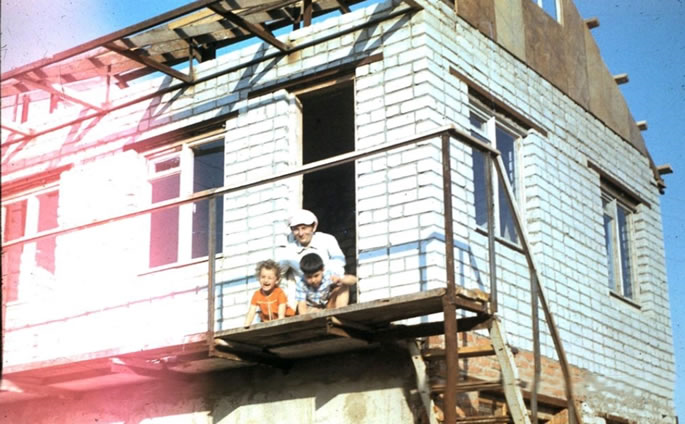Growing up in the former Soviet Union, like many fellow citizens, we spent our summers at a dacha—a small primitive house outside the city where most people used their days for growing fruits and vegetables, and preserving them for the winter months. For many Soviet children, this was the ultimate summer vacation—running around the garden and eating fresh fruits and berries. For adults, it was mostly work, preparing jams, fruit compotes, dried apples, and other preserves, the winter months when there would be little nourishing food in the stores. Government land was specifically allocated for these purposes. Some locations had nearby lakes or rivers; others offered land without any natural body of water nearby. Children sprayed themselves with water from the hoses and ran outside till sunset. Summers at a dacha were simple, predictable and straightforward for a Soviet child.
My family was lucky. As a university professor, my father was able to obtain a piece of land an hour away from our hometown of Saratov, right on the coast of the Volga River. That meant swimming, an unlimited supply of fish and all-day water activities—absolute paradise for any child growing up in the 1980s. My father, being handy, built a rather impressive 500-square-foot, two-story house with a small kitchen on the first floor. Though this was a tiny, simple construction, to us it was a palace. The bathroom was outside in a far corner of the lot (a huge hole in the ground surrounded by rather memorable wooden walls).
Our “mansion” with its three tiny rooms and a porch was considered an absolute gem, and was just a 10-minute walk to the Volga River. Every day, we were woken up by a rooster that lived in the nearby village. Our dacha was and still is my “happy place.” It’s not the physical building that I long for, but rather the feeling of those carefree days of pure childhood innocence.
As I close my eyes, I see myself as a 7-year-old girl with curly hair sitting near the raspberry bush with my little brother, or swimming in the warm waters of the Volga. I imagine my parents forever cleaning fish and picking fruit from the garden.
Our dacha’s location had another impressive component: It was less than an hour’s drive from where Yuri Gagarin (the first human to journey to outer space) landed when he returned from his mission.
His capsule, Vostok-1, completed one orbit around Earth on April 12, 1961, and Gagarin became an instant hero in the Soviet Union and a celebrity worldwide. The landing site, 40 kilometers out of Saratov, was marked by a commemorative monument right near our dacha. Thousands flooded to see the site.
I was struck by the contrast between our rather simple and ordinary summer residence and this extraordinary place nearby. Many years have passed since my family immigrated to the United States in 1989, yet the memories of our visits to the famous landing site from our rather ordinary reality remain clear in my mind.
For years I was fascinated by this gap in paradigms: the redundant pace of most people’s lives and the bigger-than-life experiences of others. Needless to say, many extraordinary people don’t necessarily live long years, and some are unable to maintain routine family dynamics. Yuri Gagarin lived only for 34 years, and he had a complicated life. On the other hand, most people have less colorful experiences and despite investing enormous amounts of energy and perseverance, day after day.
A typical look on long summer days.
I am not comparing which lifestyle is easier or more meaningful, but I came to the conclusion that there is nothing more extraordinary than an ordinary life. It’s astonishing to see the commitment of a mother to her infant child, or of a father, who regardless of any challenges, is dedicated to ensuring his family’s well-being. Morning after morning, night after night, people do ordinary things, again and again, to benefit their families and communities.
Since I was blessed to learn about my Jewish heritage, I was surprised by the repetitiveness of the daily, weekly and yearly cycles of prayer, holidays and traditions. But I’ve come to understand that consistency is the ultimate secret of Jewish perseverance.
Our regular schedule of three daily prayers is not affected by our moods or struggles. Even when we are not feeling emotionally invested or uplifted, we continue, for this process itself will help return things to normal and create a sacred space for clarity and connection.
There are definitely some grandiose, monumental and awe-inspiring moments in all of our lives, yet this is not what most days are about. Perhaps not enough praise is given to the magnificently normal days in our lives. While I treasure the memories of driving up to the monument of Yuri Gagarin and learning about his groundbreaking journey through space, I also embrace and celebrate the routine cycle of our everyday lives.
After all, every single moment that is infused with connection, humility, patience, and kindness becomes truly extraordinary.

